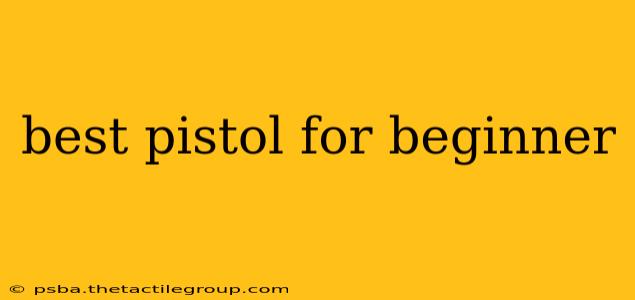Choosing your first pistol can feel overwhelming. The sheer variety of models, calibers, and features available can leave even experienced shooters feeling slightly lost. This guide will help you navigate the options and select the best pistol for your needs as a beginner. We'll focus on safety, ease of use, and features that make learning to shoot enjoyable and effective.
Key Factors to Consider When Choosing Your First Pistol
Before diving into specific models, let's examine the crucial factors that determine the ideal beginner pistol:
1. Caliber: Smaller is Often Better to Start
While the allure of powerful calibers like .45 ACP is strong, it's generally recommended that beginners start with smaller calibers like 9mm or .22 LR. These calibers offer:
- Less Recoil: Easier to control, leading to better accuracy and a more pleasant shooting experience. Excessive recoil can be intimidating for new shooters.
- Lower Cost per Round: Practice is crucial, and lower ammunition costs allow for more range time.
- Wider Availability: Ammunition for these calibers is readily available at most gun stores.
The .22 LR is especially popular for beginners due to its extremely low recoil, making it perfect for building fundamental shooting skills.
2. Action Type: Simplicity is Key
For beginners, a semi-automatic pistol with a striker-fired action is generally recommended. These pistols are:
- Simple to Operate: Easier to learn and use compared to revolvers or pistols with more complex mechanisms.
- Reliable: Striker-fired pistols are known for their reliability and ease of maintenance.
- Lightweight: This reduces fatigue during extended shooting sessions.
Avoid overly complex designs with many safety features until you've gained experience.
3. Size and Weight: Ergonomics Matter
The pistol should fit comfortably in your hand. A pistol that's too large or too small will be difficult to control and can lead to discomfort or injury. Consider visiting a gun range and trying out different pistols to find one that feels right. A slightly lighter pistol will also help reduce fatigue during practice.
4. Safety Features: Prioritize Safety
All firearms should be treated with utmost respect. Ensure your chosen pistol has adequate safety features. While many modern pistols have passive safety mechanisms (like a trigger safety), understanding and consistently employing proper gun handling techniques is paramount.
Top Pistol Recommendations for Beginners
While specific recommendations depend on individual hand size and preference, here are some generally well-regarded pistols popular among beginners:
- Ruger Mark IV (.22 LR): A classic choice known for its reliability, accuracy, and ease of use. The low recoil of the .22 LR makes it ideal for practicing fundamentals.
- Smith & Wesson M&P 9mm: A popular and versatile semi-automatic pistol known for its comfortable grip and ease of use. The 9mm offers a good balance between recoil and stopping power.
- Glock 19 (9mm): Another popular choice; known for its reliability and relatively straightforward design. However, it may be slightly larger for some beginners.
- Sig Sauer P320 (9mm): A modular pistol offering adaptability for various hand sizes and preferences. Its ease of use and wide availability of accessories also make it an appealing option.
Disclaimer: This list is not exhaustive, and many other excellent options exist. It is essential to handle and potentially test-fire different models before making a purchase.
Beyond the Pistol: Essential Gear for Beginners
Investing in the right gear enhances your shooting experience and safety:
- Eye and Ear Protection: This is non-negotiable. Always wear appropriate eye and ear protection at the shooting range.
- Ammunition: Purchase quality ammunition from a reputable source.
- Holster (Once You're Comfortable): A proper holster ensures safe carrying and quick access (once you've received proper training in safe firearm handling).
- Quality Cleaning Kit: Regular cleaning maintains the reliability of your firearm.
Final Thoughts: Seek Professional Instruction
This guide provides a starting point. The most crucial aspect of responsible gun ownership is proper training. Take a certified firearms safety course before handling any firearm and regularly practice at a supervised shooting range. This will not only enhance your skills but also cultivate safe and responsible gun ownership habits. Remember to always follow all local, state, and federal laws regarding firearm ownership and use.

